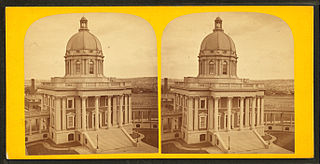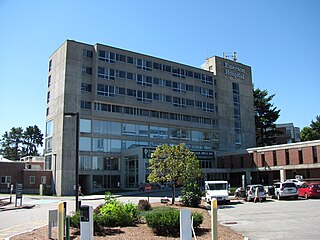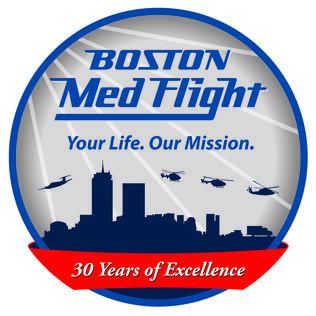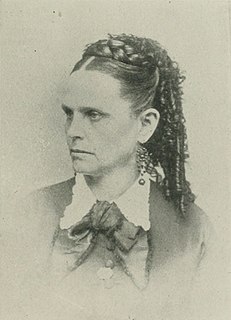
Homeopathy or homoeopathy is a pseudoscientific system of alternative medicine. It was conceived in 1796 by the German physician Samuel Hahnemann. Its practitioners, called homeopaths, believe that a substance that causes symptoms of a disease in healthy people can cure similar symptoms in sick people; this doctrine is called similia similibus curentur, or "like cures like". Homeopathic preparations are termed remedies and are made using homeopathic dilution. In this process, the selected substance is repeatedly diluted until the final product is chemically indistinguishable from the diluent. Often not even a single molecule of the original substance can be expected to remain in the product. Between each dilution homeopaths may hit and/or shake the product, claiming this makes the diluent remember the original substance after its removal. Practitioners claim that such preparations, upon oral intake, can treat or cure disease.

The Tufts University School of Medicine is the medical school of Tufts University, a private research university in Massachusetts. It was established in 1893 and is located on the university's health sciences campus in downtown Boston.

The Longwood Medical and Academic Area is a medical campus in Boston, Massachusetts. Flanking Longwood Avenue, LMA is adjacent to the Fenway–Kenmore, Audubon Circle, and Mission Hill neighborhoods, as well as the town of Brookline.

The Boston City Hospital (1864–1996), in Boston, Massachusetts, was a public hospital, located in the South End. It was "intended for the use and comfort of poor patients, to whom medical care will be provided at the expense of the city, and ... to provide accommodations and medical treatment to others, who do not wish to be regarded as dependent on public charity." In 1996, it merged with the Boston University Medical Center Hospital to form the Boston Medical Center.
The Worcester Foundation for Biomedical Research (WFBR) was a non-profit biomedical research institute based in Shrewsbury, Massachusetts, United States.

Carney Hospital is a 159-bed community teaching hospital in Dorchester, Massachusetts, affiliated with Tufts University School of Medicine and Tufts Medical Center. The hospital had its beginnings in 1863 in South Boston. It was the first Catholic hospital in New England. Among its first patients were American Civil War soldiers. In 1892 a Carney Hospital team performed the first abdominal surgery in Boston.

Emerson Hospital is a hospital located in Concord, Massachusetts, at 133 Old Road to Nine Acre Corner, founded in 1911 on 40 acres (16 ha) donated by Charles Emerson, a nephew of Ralph Waldo Emerson. It is a full-service, non-profit community hospital and acute care medical center with 177 beds, providing advanced medical services to over 300,000 individuals in 25 towns.

Boston MedFlight (BMF) is a non-profit organization that provides emergency scene response and emergency interfacility transfer in Eastern Massachusetts at the Critical Care level, which is higher than a paramedic-level ambulance crew's certification, using both aircraft and ground ambulances.

The Lahey Hospital & Medical Center, formerly known as the Lahey Clinic, is a physician-led nonprofit teaching hospital of Tufts University School of Medicine based in Burlington, Massachusetts. The hospital was founded in Boston in 1923 by surgeon Frank H. Lahey, M.D., and is managed by Beth Israel Lahey Health. U.S. News & World Report has cited it several times on its list of "America's Best Hospitals" in the category of urology.

Founded in 1891, Lowell General Hospital is an independent, not-for-profit community hospital serving the Greater Lowell area and surrounding communities. With two primary campuses located in Lowell, Massachusetts, Lowell General Hospital offers a full range of medical and surgical services for patients. Lowell General Hospital is a member of the Voluntary Hospitals of America. Lowell General is affiliated with Tufts Children's Hospital in Boston.

The Boston University Chobanian & Avedisian School of Medicine, formerly the Boston University School of Medicine, is one of the graduate schools of Boston University. Founded in 1848, the medical school was the first institution in the world to formally educate female physicians. Originally known as the New England Female Medical College, it was subsequently renamed Boston University School of Medicine in 1873, then Chobanian & Avedisian School of Medicine in 2022. In 1864, it became the first medical school in the United States to award an M.D. degree to an African-American woman.
Northeastern University School of Pharmacy is the pharmacy school at Northeastern University in Boston, Massachusetts. It is one of four schools that comprise the Bouvé College of Health Sciences. Northeastern's Doctor of Pharmacy (PharmD) program is the only PharmD cooperative education, or co-op, program in the United States. Students who participate in the co-op program are placed in paid, full-time positions that provide profession experience.

The Massachusetts Society for the Prevention of Cruelty to Animals-Angell Animal Medical Center (MSPCA-Angell) is a 501(c)(3) non-profit organization with its main headquarters on South Huntington Avenue in the Jamaica Plain neighborhood of Boston, Massachusetts. It was founded in 1868, and is the second-oldest humane society in the United States. "MSPCA-Angell" was adopted as the society's identity in 2003, and indicates the names of its two closely related predecessor organizations: Massachusetts Society for the Prevention of Cruelty to Animals and Angell Animal Medical Center. The organization provides direct care to thousands of homeless, injured, and abused animals each year, and provides animal adoption, a veterinary hospital, advocacy, and humane law enforcement.

Boston Regional Medical Center was a 187-bed hospital located in Stoneham, Massachusetts. Previously known as New England Sanitarium and Hospital and later New England Memorial Hospital, it was located within the Middlesex Fells Reservation along Woodland Road in Stoneham, Massachusetts, until it closed in February 1999 for financial reasons.
Baystate Health is a not-for-profit integrated health system headquartered in Springfield, Massachusetts, serving Western Massachusetts and the Knowledge Corridor Region of Massachusetts and Connecticut. The system has 5 hospitals, over 80 medical practices, and 25 reference laboratories. With 12,000 employees including 1,600 physicians, it is one of Massachusetts' largest employers. Baystate also owns the for-profit insurer Health New England.

The Boston Medical Library of Boston, Massachusetts, was originally organized to alleviate the problem that had emerged due to the scattered distribution of medical texts throughout the city. It has evolved into the "largest academic medical library in the world".
The Rutland Heights State Hospital was a state sanatorium for the treatment of pulmonary tuberculosis located in Rutland, Massachusetts, USA built for the purpose of treating Tuberculosis patients. The facility was the first state-operated sanatorium in the United States, opening in 1898 and operating for around 93 years before its closure in 1991. Rutland Heights opened under the title “Massachusetts Hospital for Consumptives and Tubercular Patients,” to which it operated until 1900, where it was renamed to “Massachusetts State Sanatorium.” In 1919 it was renamed to “Rutland State Sanatorium,” which was the longest operating name of the hospital, effective until 1963. In 1963, it was renamed briefly to “Rutland Hospital,” and successively in 1965 to “Rutland Heights State Hospital,” which was the final title of the hospital until closing. In 2004, the hospital was demolished.
Middletown State Homeopathic Hospital was a hospital for the treatment of mental disorders located in Middletown, New York. It opened on April 20, 1874, and was the first purely homeopathic hospital for mental disorders in the United States. The hospital, which served "mentally ill patients from Orange, Sullivan and Ulster Counties". employed a number of new techniques for the treatment of mental disorders, most notably the use of baseball as a therapy.
Lucy W. Abell was an American physician and the founder of DC Women's Physiological Society. She was one of the first, if not the first, woman to practise homeopathy in Boston, Massachusetts.

Esther W. Taylor was an American physician, one of the earliest women physicians in New England.














